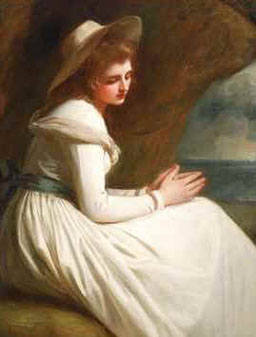Emma is a young woman who knows her own happiness, but, as Sarah Emsley suggests, she does not always know the happiness of others. She seems to have it all, but in the course of the novel, she is brought to the realization the that perhaps she does not know it all. Emsley says, "I read Emma as primarily responsible for her own moral education, and education in charitable thought. Her education is dependent on her choosing to change..."

This idea is contrasted with critics who have argued that it is Mr Knightley who tells Emma what to think and how to act, but Emma, as we learn, can do this very well on her own. But her conversations with Mr Knightley help her to stop and think. Emma does not suffer from too much solitude, in fact, she does not allow enough time for self-knowledge. Emma spends most of her time arranging the lives of others and must learn that charity is not about power.
Her first moment of realization is when Mr Elton, whom she had destined for her friend, proposes- "making violent love to her." She is then forced to stop and think. "Emma sat down to think and be miserable.- It was a wretched business, indeed!" She realizes that she had "taken up the idea...and made everything bend to it. Emma admits to herself, "The first error and the worst lay at her door. It was foolish, it was wrong, to take so active a part in bringing any two people together...She was quite concerned and ashamed, and resolved to do such things no more." When Emma sees Mr Elton again she is reminded that it was she who brought about the misunderstanding. "...his sight was so inseparably connected with some very disagreeable feelings, that except in a moral light, as a penance, a lesson, a source of profitable humiliation to her own mind, she would have been thankful to be assured of never seeing him again."

Later after Harriet sees the Martins, she hurries to Emma's, "Oh, Miss Wodehouse, do talk to me and make me feel comfortable again," but Emma has learned something from her experience with Mr Elton. "Very sincerely did Emma wist to do so; but it was not immediately in her power. She was obliged to stop and think. She was not thoroughly comfortable with herself." Emsley states, "Emma's discomfort at this point is not enough to seriously reexamine her initial judgment that Robert Martin is not good enough for Harriet, but it is enough to make her stop and think. And if she does this often enough, Austen implies, she will approach a better understanding of truth, and will be better equipped to behave charitably to others. What charity is not, therefore, is looking after others by telling them how to live. This is Mrs Elton's idea of charity (Jane Fairfax)...Mrs Elton also sees charity as a matter of style...what those in power offer to those without power."
A positive example of charity is that of Miss Bates. Emma admits, "I really believe, if she had only one shilling in the world, she would be very likely to give away sixpence of it." Emma often shows generosity to Miss Bates and others who are poor, but, as Emsley argues, "her charity her is mostly action, not thought." And it is not empty action, to be sure, "enter[ing] into their troubles with ready sympathy, and always gave her assistance with as much intelligence as good will." What Emma must discover, therefore, is how to be charitable in her thoughts.

Emma's second moment of realization is at Box Hill after teasing Miss Bates. It does not come immediately, and may not have come at all, if Mr Knightley had not said something- prompting Emma to think. Although it is Mr Knightley who initially opens her eyes, it is Emma herself who "as she reflected more, she seemed but to feel it more. She had never been so depressed." Toward Miss Bates, Emma begins to realize, "She had been often remiss, her conscience told her so; remiss, perhaps, more in thought than fact; scornful, ungracious." Emsley argues, "Mr Knightley has chided her only for the one public remark, but Emma's consciences tells her that she has been thinking scornfully of Miss Bates all along, even while sending her pork and paying her visits...In fact, Emma's own conscious is more severe in judging her thought and action than Mr Knightley is. The realization that she has not loved her neighbor as herself..."
Again it takes prompting for Emma to have her third moment of realization. When Harriet comes to Emma gushing that she wishes to marry Mr Knightley and has some idea of him thinking along the same lines, Emma quickly becomes aware "that Mr Knightley must marry no one but herself!" Austen describes Emma's mind as one that "makes rapid progress." Emsley writes, "This description is important: Emma has the kind of quick mind that can analyze behavior thoroughly. Her intelligence is sharp, but her initial perceptions are a little dull, perhaps because she is so confidant of her social position that she lacks the critical impulse...Intellectual self-examination may be painful, whether one is analyzing the difficulties of acting charitably toward other people, or the complexities of romantic love."
The virtuous life is not a perfect one. It is, like Emma, "faultless in spite of all [it's] faults." Emsley makes the point that, "Austen suggests, one may achieve something like perfect happiness, not happiness as an end result, but as a process open to revision."
1 comment:
I like the Emma description and it is fresher on my mind having read it recently. I'm a bit like that description but I make quick initial perceptions and then my intelligence dulls ;)
Post a Comment